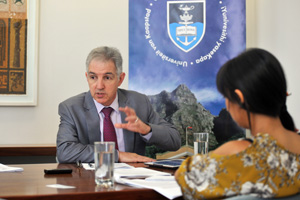Enhanced financial aid policy makes UCT affordable to all
12 December 2012 | Story by Newsroom Access: Dr Max Price yesterday announced major new developments in UCT's financial aid package for 2013.
Access: Dr Max Price yesterday announced major new developments in UCT's financial aid package for 2013.
Just as UCT prepared to graduate thousands of the current cohort of students, it made an announcement that would please the next ones coming in.
The university yesterday announced that from January 2013 the institution will implement a significantly improved financial assistance policy for South African undergraduate students that will guarantee the necessary financial support to any student who is accepted on academic grounds and eligible for assistance.
"In other words, no student will be turned away simply on the basis of financial need," Vice-Chancellor Dr Max Price told press at a small briefing session.
In addition, Price announced, students who are already in the UCT system and receiving financial assistance will not pay any more in 2013 than they paid in 2012, despite the routine annual increase in student fees.
The new financial aid policy will make more funds available to a larger number of eligible students to cover a wider variety of need. The Institution has increased its financial assistance to R100 million that is available from UCT's own coffers. This amount is available over and above the R120 million that we expect the National Student Financial Aid Scheme of South Africa (NSFAS) will make available to UCT students for financial assistance.
This is also over and above the approximately R200 million available to financially needy students that come from different corporations and other donors. In addition there are approximately R20 million worth of merit-based scholarships available to students. Thus the aggregate available under the new UCT financial aid policy and practice will make over R441 million available to eligible UCT students for financial assistance.
When making financial aid packages available to students UCT considers the Total-Cost-Of-Study which typically includes course fees, accommodation, food allowance, local travel, books and sundries. On average a typical year of study at UCT (including fees, accommodation, books, foods and sundries) will cost a student R80 000 per year.
The extent of the financial assistance UCT will give to a student depends on their particular annual family income and circumstances.
In the case of the poorest of students with a family income between nil and R50,000 a year, UCT will provide financial assistance to cover almost the entire Total-Cost-Of-Study The family will be expected to make a small contribution based on their specific annual family income. For example those families with very little income will be expected to pay R1 000 for the year and financial aid will cover the rest (R79 000).
Those families with a slightly higher annual family income (but still under R230,000) will be expected to pay a slightly higher contribution e.g. most families with an annual family income of around R100 000 will pay around R10 000 of the Total-Cost-Of-Study. and the financial aid package will cover R70,000. A family with an annual family income of around R200 000 will pay around R18 000 of the Total-Cost-Of-Study. and the financial aid will cover the rest. The balance (financial aid package) in each of these examples will be provided in the form of a UCT administered bursary and a NSFAS loan. It must also be noted that up to 40% of the NSFAS loan becomes a bursary if the student passes all courses. Also note that at UCT these expected family contributions are lower than what NSFAS advise in their guidelines. As NSFAS assistance is limited to those that meet the National Means Test eligibility (an approximated R230 000 to R350 000 household income) it has previously placed many students in a position where they could not qualify for financial aid yet often found University education unaffordable. The enhanced financial aid policy will now also cover these students in that all students with family incomes between R230,000 and R480,000 can apply for a UCT bursary to assist them towards covering parts of their course fee costs.
These bursaries could cover up to 50% (half) of the tuition fee for a family with an income below R330 000, 40% of the tuition fee for a family with an income between R330 000 and R430 000 and 30% of the tuition fee for families with an income between R430 000 and R480 000. These students are also eligible to apply for loans to cover a further R25 000, subject to meeting the requirements.
Thus out-of-pocket payment for these middle income students may be reduced from R80 000 to about R35 000, R40 000 and R50 000 depending on the particular case.
A laptop pilot programme is being launched in 2013 to include the provision of laptops to financial aid students in specific targeted faculties.
"UCT is committed to ensure that we get the best students from all parts of the country," said Price. "We have implemented this financial aid mechanism to ensure that lack of finances is never an obstacle in coming to the University of Cape Town. It is very competitive to get an academic place at UCT. But if a student has succeeded in this there should be no financial reason for the student not to take up his or her place at the university."
 This work is licensed under a Creative Commons Attribution-NoDerivatives 4.0 International License.
This work is licensed under a Creative Commons Attribution-NoDerivatives 4.0 International License.
Please view the republishing articles page for more information.










